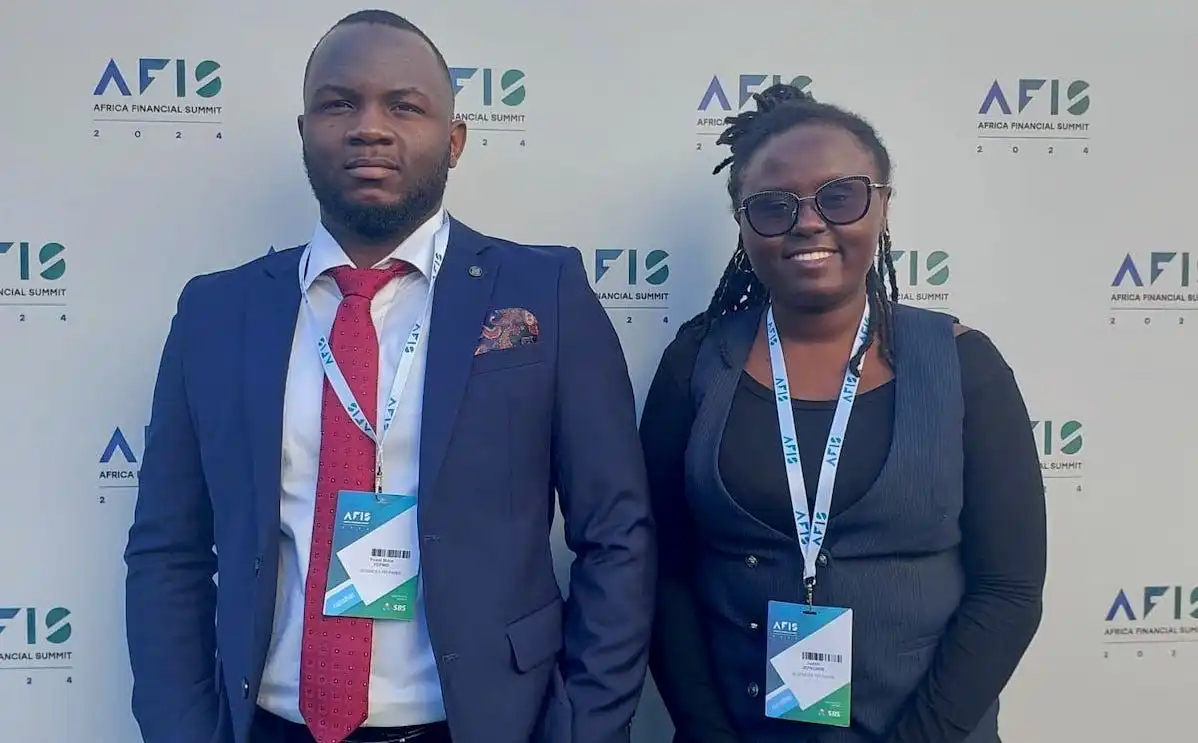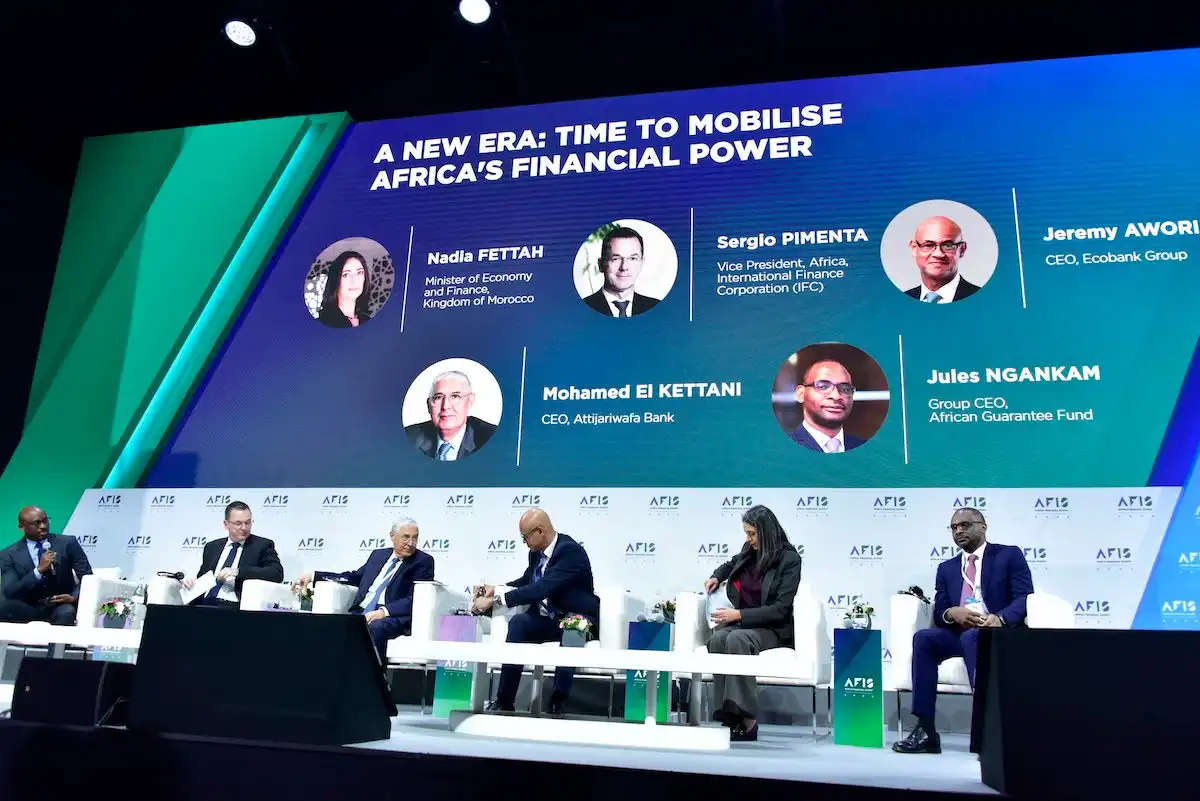Home>Student Experience: Attending the Africa Financial Summit 2024 in Casablanca
20.12.2024
Student Experience: Attending the Africa Financial Summit 2024 in Casablanca
Two Sciences Po Mastercard Foundation Scholars at Sciences Po were selected to attend the Africa Financial Summit (AFIS) that took place in Casablanca (Morocco) in December.
Judith Jepkorir is a Master's student in Economic Law at Sciences Po Law School and Yvant Brice Yepmo is a Master's student in International Business and Sustainability at Sciences Po School of Management and Impact.
Let's read about their student experience at this unique summit.
BACKGROUND
On 9 and 10 December 2024, AFIS brought together over 1,000 leaders from across Africa’s financial sector, including policymakers, regulators, executives from major banks and insurance companies, as well as representatives from fintech, investment firms, and many more. The discussions centred on the structural reforms needed to bolster the resilience of Africa’s financial sector.
The summit took place in the context of a diminished international financial presence on the continent, underscoring the need for African champions to take the lead in driving economic prosperity. Themed “A New Era: Time to Mobilise Africa’s Financial Power”, the key focus areas of the Summit included strengthening Africa’s financial institutions, increasing regional integration, accelerating cross-border payments, building a pan-African stock exchange, and solving challenges using home-grown African solutions.
This year’s edition of the Summit was jointly co-hosted by the Jeune Afrique Media Group, the International Finance Corporation (IFC) Africa, and the Kingdom of Morocco. Notably, for the first time, AFIS welcomed student delegates from Sciences Po, recognising the vital role of young voices in shaping solutions to the continent’s most pressing challenges.
HIGHLIGHTS
Running a whole two days, the summit featured several exciting panel discussions on topics lined up, strategic round tables analysing interesting financial issues, side events hosted by partners of the summit, and coffee break opportunities to network and make lifetime connections.
The discussions detailed the status of the African markets in terms of how new opportunities have arisen for the African continent to leverage and benefit from. Jeremy Awori, Ecobank Group CEO, spoke for example about the emergence of fintech and crypto within the conventional financial system, which presents both challenges and opportunities.
To get ready to embrace these developments, he suggested that African countries need to strengthen their policy, institutional, and regulatory frameworks to accommodate these new developments. He further urged that there is a need to scale up the capacities of African countries to exploit opportunities within areas like geothermal and wind energy, which Africa is heavily endowed with.
There was also a resounding voice that there is a need to build the trust and confidence of investors in the continent. Since predictability and certainty are the key factors that inspire investor confidence, Jeremy Awori urged that Africa should tell its story of success so that it can be viewed as an investment-friendly destination with diverse opportunities for all levels of investors. Sergio Pimenta, IFC Africa President, challenged African businesses to take advantage of the support provided by institutions like the IFC and grow their investments in Africa.
I also attended two other forums that discussed insurance integration under the African Continental Free Trade Area, and unlocking intra-African stock trading. From both sessions, the panellists recommended the need for streamlining regional laws and cooperation by African states if the full benefits of integration are to be reaped on the continent.
It was impressive to discover that the African Exchanges Linkage Project (AELP) is already in place, making great progress in linking stock exchanges across the African continent to form a single trading platform from which traders can seamlessly buy and sell listed equities, bonds, and many more.
CONCLUSION
AFIS 2024 was a game changer. It was an honour to represent Sciences Po at the summit, where so many pertinent issues of concern to the African continent were being addressed. It was so interesting to hear from experts, contribute to the discussions, network, and build new connections. I can confirm that the summit truly lived up to its objective of developing concrete solutions to the many challenges facing Africa’s financial sector and building a more inclusive and robust pan-African financial services industry.
BACKGROUND
AFIS 2024 featured a total of 45 sessions, of which I attended 10 that resonated most with my personal and professional interests. Each session was highly engaging and provided valuable insights into Africa's developmental trajectory.
KEY INSIGHTS
One standout session was titled "A New Era: Time to Mobilise Africa's Financial Power." This session emphasised the urgency of Africa taking ownership of its financial future by leveraging regional and pan-African financial resources. Key discussions centred on the pivotal role of African leaders and institutions in addressing the continent’s economic needs, particularly in light of reduced international financial support.
The session explored the potential of Africa’s financial institutions to drive growth in critical sectors such as trade finance, infrastructure, industrialisation, extractive, and renewable energy. A compelling call to action emerged: Africa must consolidate its financial sector, invest in technological innovation, and cultivate human capital to ensure integration into global financial networks. As someone pursuing expertise in sustainable finance and investment, this session illuminated the strategic importance of regional collaboration and institutional development, aligning directly with my aspirations to support impactful, scalable financial solutions for the continent.
Another impactful session I attended was "Energy, Private Equity, Real Estate: How Can African Institutional Investors Better Exploit These Opportunities?" This session delved into the rising interest of African institutional investors in alternative assets, including private equity, real estate, and infrastructure, as tools to diversify portfolios and optimise risk-adjusted returns. These asset classes, however, remain significantly underrepresented, constituting just 3% of total assets under management. This gap stems from challenges such as the lack of tailored local investment products, limited risk management capacity, and restrictive regulatory frameworks.
Participants, including representatives from pension funds, sovereign wealth funds, insurers, and regulators, highlighted the need for regulatory reforms, capacity building, and innovation to unlock the full potential of these asset classes. For me, this session provided valuable insights into how institutional investors can drive sustainable development while achieving financial returns—an area I aim to contribute to in my career by bridging gaps between investment opportunities and impactful outcomes.
REFLECTIONS
Beyond the sessions, AFIS 2024 was an unforgettable experience that offered immense opportunities for learning, networking, and self-reflection. Engaging with distinguished participants, I was reminded of the importance of laying a solid foundation for my career and embracing the possibility of failure as a stepping stone to success.
Two meetings were particularly transformative: my conversations with Patrick Njoroge, former Governor of the Central Bank of Kenya, and Ashok Shah, Director of APA Insurance in Kenya. Initially, my ambition was to return to Africa as soon as possible to contribute to its development. However, they offered a different perspective, emphasising the importance of returning only when I could bring significant added value. Their guidance underscored the need to first acquire extensive experience and reach a high level of decision-making. This approach, they argued, would enable me to make a meaningful and sustainable impact on the continent.
AFIS 2024 not only deepened my understanding of key economic and financial challenges but also reshaped my vision for the future. The event reinforced my commitment to building expertise and influence, preparing me to contribute meaningfully to Africa’s development when the time is right.
Since 2017, Sciences Po has been in partnership with the Mastercard Foundation Scholars Program. This partnership enables bright and ambitious students from Sub-Saharan Africa to enroll in a degree programme in the social sciences at Sciences Po, with the aim of training a new generation of change-makers in their home countries.


